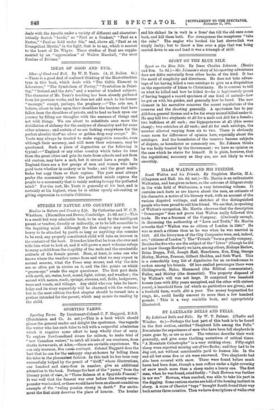IDEAS OF GOOD AND EVIL.
Ideas of Good and Evil. By W. B. Yeats. (A. H. Bullen. 6s.) —There is a good deal of confused thinking of the Maeterlinekian type in this book, which deals with "The Celtic Element in Literature," "The Symbolism of Poetry," "Symbolism in Paint- ing," "Ireland and the Arts," and a number of kindred subjects. The character of Mr. Yeats's teaching has been already gathered from his previous works, and he does not add much to his former "message," except, perhaps, the prophecy :—" The arts are, I believe, about to take upon their shoulders the burdens that have fallen from the shoulders of priests, and to lead us back upon our journey by filling our thoughts with the essences of things and not with things. We are about to substitute once more the distillation of alchemy for the analyses of chemistry and for some other sciences ; and certain of us are looking everywhere for the perfect alembic that no silver or golden drop may escape." Mr. Yeats may always be trusted to make suggestive remarks, even although their accuracy, and still more their relevance, may be questioned. Such a piece of dogmatism as the following is typical England or any other country which takes its tune from the great cities and gets its taste from schools and not from old custom, may have a mob, but it cannot have a people. In England there are a few groups of men and women who have good taste whether in cookery or in books ; and the great multi- tudes but copy them or their copiers. The poet must always prefer the community where the perfected minds express the people to a community that is vainly seeking to copy the perfected mind." For the rest, Mr. Yeats is generally at his best, and is certainly at his highest, when he is either openly advocating or giving expression to ecstatic Celticism.


























































 Previous page
Previous page